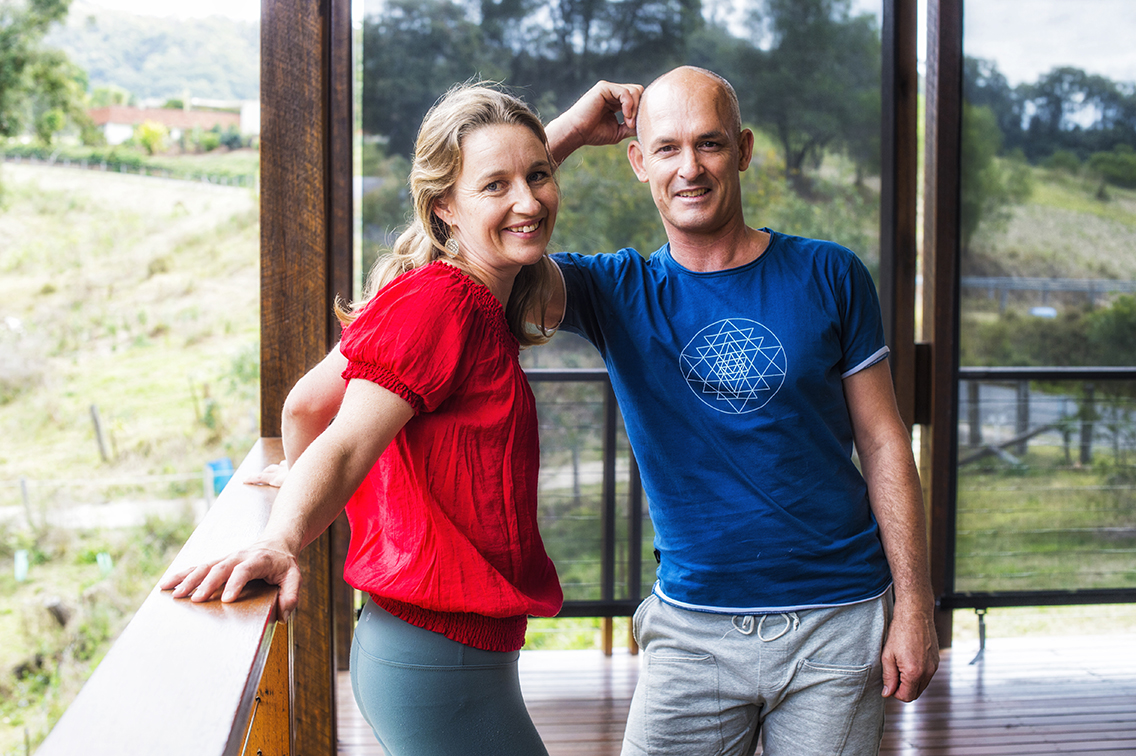Join Celia Roberts & Craig Smith this June 2019

20hr Higher-Level Learning
Certificate in BioMedical Yoga Therapy for Pain Relief
Saturday 23 June & Sunday 24 June
only 3x places remaining!
This is a captivating weekend experiencing first hand, in the beautiful surrounds of the Upper-Brookfield Sanctuary, what it means to be at one in body and mind in order to rejuvenate. With a combination of evidence-based knowledge and traditional wisdom you will learn processes of Biomedical Yoga Therapy, Meditations, as well as specific processes for pain rehabilitation that focus on the healing capacity of the mind and body.
This 2 day workshop is a professional development program for those wishing to incorporate yoga therapy tools and mindfulness into pain management programs and for interested members of the public.
Chronic pain is a growing concern in Australian society; more and more people are suffering regularly with moderate to intense pain. If you have ever experienced any type of body aches and pains, whether that be from physical fatigue, mental exhaustion, or perhaps you simply feel that your body is not performing in the capacity you would like it too: this is the weekend workshop for you! Learn how to work with pain and discomfort in your own body and the science of pain rehabilitation to assist others.
This weekend will combine evidence-based knowledge with traditional wisdom in combination with Biomedical Yoga Therapy, Meditations, as well as specific processes for mindful pain rehabilitation.
Saturday 23 June 2019
Hosted by Celia Roberts Bsc
Biomedical Yoga Therapy for head, neck, shoulders
9:30 – 1.00
In this informative day of experiential learning, Celia focuses on head, neck, and shoulder pain. Both morning and afternoon sessions will offer a multitude of body, mind, and yoga therapy.
Postures, poses, breathing, and relaxation techniques for upper body pain and misalignment will focus on an awareness of the body – Research has shown that “these movements are ‘intricate’ and highlight the body - mind nature of yoga that emphasizes awareness, concentration, and bidirectional communication between the mental, nervous, skeletal, and muscular system” (Crow, Jeannot, & Trewhela, 2015).
Though not a new concept, recent FMRI studies and data analysis confirms connections between chronic pain in comorbidity with anxiety and depression. Even if you don’t suffer from anxiety or depression, stress and fatigue can give rise to pain in the body. As such, there is an open awareness to the benefits meditation offers for both mental and physical wellbeing. The liberation of body and mind comes with deep presence and the ability to attune to your bodily sensations. Learn how to manage emotional and physical pain through yoga therapy and meditation.
If you experience any amount of pain, whether it is mild to chronic, yoga and/or meditation is an amazing therapy that can offer you relief where modern medications may not.
We will be exploring:
- A personal bodily focus based in Ayurvedic emotional body work
- The neuroscientific basis for why yoga and meditation is an effective treatment
- Yoga therapy practices that have been proven to provide pain management and to cultivate holistic well-being
- Techniques of internal and external rotations, mobilization for shoulder joints, triggers of relaxation, as well as resistance work
- Body alignment and protection for reduced head, neck, jaw, temples, eye and shoulder pain
Saturday 23 June 2019
Hosted by Celia Roberts Bsc
Neuroplasticity of Pain & Meditations for Pain Relief
1:45 – 4:45
At BIYOME we believe in treating pain in the brain, not just the body. Pain can be treated using competitive neuroplasticity....
What is pain? Is pain simply in the mind? Is pain a symptom of emotional disturbance? Both our beliefs and the cultural context of a person’s understanding of pain can affect the way they feel pain. Pain is a subjective phenomenon in which context fundamentally affects experience.
Many of us were raised in a culture where pain was surrounded by shame, therefore when we come together to learn and speak about pain, there is a fundamental healing effect that lies in the benefits of pain externalisation: making sense of suffering emotionally and intellectually with words, images, art and sound.
Together we can learn to ‘suffer better’ by learning about the way we feel pain which can and may be affected by social conditions and our perceptions.
For example, “it makes a difference, the colour of the analgesic pill, whether your physician is wearing a white coat or casual clothes, whether you are in a loving relationship, whether you are happy with your job, whether you are excited because you're in the middle of a very aggressive sporting game, or whether you are in wartime. These things all affect the way you perceive how bad your pain is or even if you have pain.”
So, let us move together, breathe together, talk about pain, using the very best science to understand its roots in brain, mind and body.
We will be exploring:
- Neuroscientific research demonstrating the difference between psychological and physical
- How the brain understands and interprets pain
- Why physical and mental pain cannot be separated and treated as separate symptomatology
- How and why meditation works as a therapeutic practice
- Biomedical based meditations for pain awareness and management
Sunday 23 June 2019
Hosted by Craig Smith
Clinical Yoga Therapy for Back and Spinal Health
9:30 – 1:00
Join Senior Teacher Craig Smith for a weekend focused on the healing capacity of the mind and body through understanding the core principles of Yoga Therapy; “breath and spine”.
Complementary therapies for back pain have an abundance of evidence-based literature asserting their effectiveness. Moreover, there is growing awareness of the body-mind connection as it relates to the inflammatory response – this is a vital link when considering treatment for issues such as lower back pain, which is the most common complaint in complementary medicine. Furthermore, a recent Victorian article in The Age urged to prescribe yoga and mindfulness to fight back pain, such antidotes are being encouraged more and more world-wide as research uncovers more and more of what tradition has taught for centuries.
We will be exploring:
- Traditional yoga therapy wisdom behind the body-mind-pain connection and how this relates to holistic well-being.
- Processes of poses that assist in back pain management
- The advantages of practice, as well as their psychological benefits
- Pain as it relates to body alignment
- Protective practices for reduced back pain and spinal health
- Breathing practice to assist with pain management
- Moving with the nature of the spine in relation to intelligently placed steps (sequencing a practice)
Sunday 23 June 2019
Hosted by Craig Smith
Back Care Yoga for Deep Mysofascial Release
1:45 – 4:45
This fulfilling afternoon is designed to deepen awareness in the body’s fibrous connective tissues, how it supports the musculoskeletal system, and how to bring restoration through release to areas that bring discomfort or pain. Experience the total bliss of slower deep release with yoga therapy for back care with the wonderful Senior Yoga Teacher, Yoga Therapist, and Massage therapist, Craig Smith.
As the functional nature of the fascia is an all-encompassing connector and sensor, our bodies are intrinsically designed for holistic living. Therefore, when there is trauma in one area it often causes ongoing pain throughout the body and a decreased inner awareness or proprioception. This retreat will offer you release therapy that attends to proprioception and deepening awareness that reduces pain and ultimately bring about holistic well being.
We will be exploring:
- Back care for deep myofascial release from the viniyoga approach to classical yoga and yoga therapy.
- Where does myofascial connective tissue dysfunction sit in the classifications for a Viniyoga approach?
- How can you take this understanding into physiological and Biomedical knowledge?
- How does myofascial connective tissue pain and dysfunction occur according to Ancient wisdom for modern times?
- Tools and techniques for the release of tension from Myofascial Connective Tissue
- Affecting the subtleties of the human constitution to facilitate optimal results in the practice of classical yoga and yoga therapy for the individual.
At the end of this 13-hour face-to-face weekend you will be provided with materials for reading as well as a BIYOME certificate of completion. This course is intended to provide you will a substantial knowledge base in yoga therapy – this however does not qualify you as a yoga therapist. We use the term “therapy” as a reference to varied methodologies that enable well-being.
Disclaimer and Waiver:
This weekend is a registered 20hr Yoga Australia training weekend and attracts CPD points for yoga teachers, therapists, allied health professionals. Interested members of the public who are engaged in the practices of yoga and meditation may attend for interest, education and higher-level learning.
These short courses do not qualify you to become a yoga teacher or therapist. By registering and attending this course you agree to our terms and conditions and our waiver as located here. For more information on how to become fully qualified, please check our teacher training and yoga therapy training for more details.



